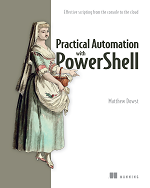Function Check-sAMAccountName {
[CmdletBinding()]
[OutputType([string])]
param(
[parameter(Mandatory=$true)]
[string]$ScriptParameters
)
# exclude the characters " * + , / : ; < = > ? @ [ \ ] |
$excludedChars = 34,42,43,44,47,58,59,60,61,62,63,64,91,92,93,124
$StringBuilder = New-Object System.Text.StringBuilder
# split name into Char Array and check each character
$sAMAccountName.ToCharArray() | ForEach-Object{
try{
# convert char to ascii decimal
$ascii = [byte][char]$_
# check if char is in the excluded range, if not add to string builder
if($ascii -le 32 -or $excludedChars -contains $ascii){
Write-Verbose "$_ - excluded character"
} else {
$StringBuilder.Append($_) | Out-Null
}
}
catch{
Write-Verbose "$_ - None ascii character"
}
}
# create new name string after removing excluded charaters
$newName = $StringBuilder.ToString()
# check that name is less than 20 characters
if($newName.Length -gt 20){
$newName = $newName.Substring(0,20)
}
# Check that last character is not the period character, ".". Remove if found
$newName = [regex]::Replace($newName,".$","")
$newName
}This function will check a string to confirm that it meets the requirements for creating a sAMAccountName. The requirements are based on the Objects with sAMAccountName Attribute section of the Active Directory: Requirements For Creating Objects wiki article.
PS C:\> Function Check-sAMAccountName {
>> [CmdletBinding()]
>> [OutputType([string])]
>> param(
>> [parameter(Mandatory=$true)]
>> [string]$ScriptParameters
>> )
>> # exclude the characters " * + , / : ; < = > ? @ [ \ ] |
>> $excludedChars = 34,42,43,44,47,58,59,60,61,62,63,64,91,92,93,124
>> $StringBuilder = New-Object System.Text.StringBuilder
>> # split name into Char Array and check each character
>> $sAMAccountName.ToCharArray() | ForEach-Object{
>> try{
>> # convert char to ascii decimal
>> $ascii = [byte][char]$_
>> # check if char is in the excluded range, if not add to string builder
>> if($ascii -le 32 -or $excludedChars -contains $ascii){
>> Write-Verbose "$_ - excluded character"
>> } else {
>> $StringBuilder.Append($_) | Out-Null
>> }
>> }
>> catch{
>> Write-Verbose "$_ - None ascii character"
>> }
>> }
>> # create new name string after removing excluded charaters
>> $newName = $StringBuilder.ToString()
>> # check that name is less than 20 characters
>> if($newName.Length -gt 20){
>> $newName = $newName.Substring(0,20)
>> }
>> # Check that last character is not the period character, ".". Remove if found
>> $newName = [regex]::Replace($newName,".$","")
>> $newName
>> }
>>
>> $sAMAccountName = 'boberton . smithingtonworth"[].:;|=+*?<>/\,'
>> Check-sAMAccountName $sAMAccountName -verbose
VERBOSE: - excluded character
VERBOSE: - excluded character
VERBOSE: " - excluded character
VERBOSE: [ - excluded character
VERBOSE: ] - excluded character
VERBOSE: : - excluded character
VERBOSE: ; - excluded character
VERBOSE: | - excluded character
VERBOSE: = - excluded character
VERBOSE: + - excluded character
VERBOSE: * - excluded character
VERBOSE: ? - excluded character
VERBOSE: < - excluded character
VERBOSE: > - excluded character
VERBOSE: / - excluded character
VERBOSE: \ - excluded character
VERBOSE: , - excluded character
boberton.smithingto
